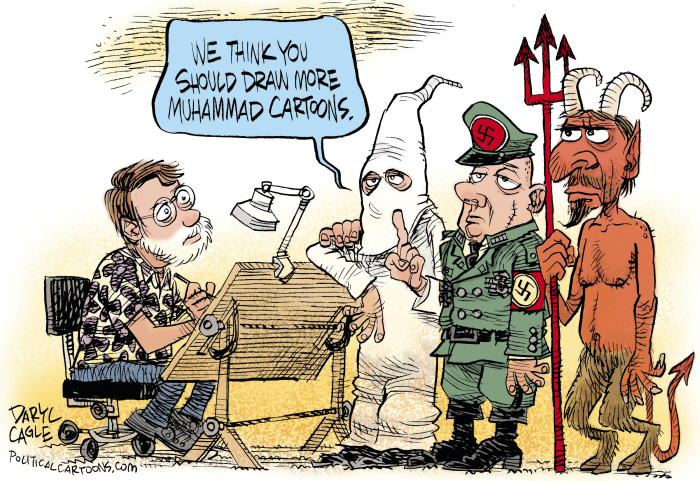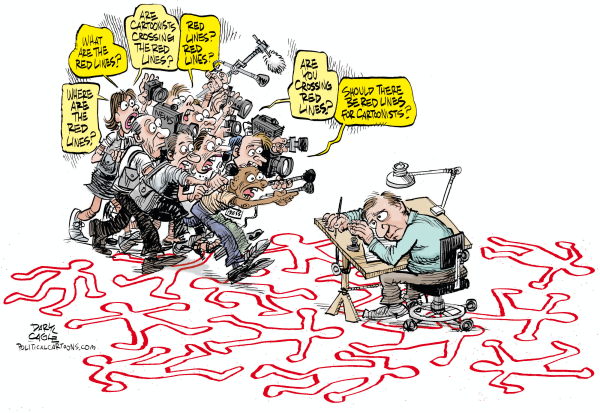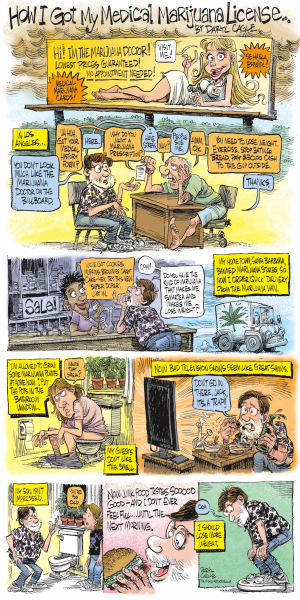 When American cartoonists look around the world at other cartoonists, we see strange cartoons and an even stranger business. While American cartoonists are most concerned about building a list of publications that print our cartoons, in much of the world cartoonists are motivated to build their CV’s (or resumes) by entering contests. For foreign cartoonists who live in countries where it is impossible to make a living selling cartoons for publication, it makes perfect sense to make a living doing something else while chalking up cartooning successes in contests.
When American cartoonists look around the world at other cartoonists, we see strange cartoons and an even stranger business. While American cartoonists are most concerned about building a list of publications that print our cartoons, in much of the world cartoonists are motivated to build their CV’s (or resumes) by entering contests. For foreign cartoonists who live in countries where it is impossible to make a living selling cartoons for publication, it makes perfect sense to make a living doing something else while chalking up cartooning successes in contests.
The foreign cartoonists, and the people who run these worldwide contests often wonder why American cartoonists don’t participate. Some feel slighted that “arrogant and elitist” American cartoonists show no interest in their contests. For our part, these contests often include rules that American cartoonists find daunting. The winning cartoons often seem to us to be incomprehensibly foreign.
The winning cartoons typically have no words; the foreign cartoonists see the cartoons as simple and elegant where the American cartoonists often see them as unsophisticated. Winning international cartoons often depict dark scenes, like prison, or unrequited love, or torture, or frustration with authority or bureaucracy. American cartoonists call typical world contest winners “daisies in the gun barrels” cartoons. With recent winners we’re seeing more of the contrast between the human condition and new technology or bureaucracy.
 One of the biggest contests, the World Press Cartoon (WPC) contest in Portugal, has been making a special effort to get American cartoonists to submit entries. They have three categories: gag, caricature and editorial cartoons, each with a 5,000 Euro prize. One of the three category winners brings home the grand prize, a whopping 20,000 Euros (or $31,400.00). WPC just announced their winners for this year which fall squarely into the “strange” and “incomprehensible” category.
One of the biggest contests, the World Press Cartoon (WPC) contest in Portugal, has been making a special effort to get American cartoonists to submit entries. They have three categories: gag, caricature and editorial cartoons, each with a 5,000 Euro prize. One of the three category winners brings home the grand prize, a whopping 20,000 Euros (or $31,400.00). WPC just announced their winners for this year which fall squarely into the “strange” and “incomprehensible” category.
The Grand Prize winning cartoon is by German cartoonist, Rainer Ehrt, whose big win can be seen in excited announcements on dozens of web sites, none of which are in English. All the winning cartoons can be seen on the WPC web site at worldpresscartoon.com.
The Grand Prize winning cartoon is a lovely rendering but I didn’t get it. A bunch of guys are sitting in a pile of desks, each with a European Union flag; more desks are being added, and one desk is smoking. I know, it’s a Euro-thing and my mind isn’t running in Euro-mode. I wrote to the WPC people, asked them what the cartoon means and I got this reply:
The Grand Prix, Rainer Ehrt cartoon is based on a Brueghel painting. He uses the idea of a Babel Tower applied on an endless enlargement of Europe with its multiple languages and differences, and also, with a threatening dark clown above the Tower that give us an idea of an uncertain future…
 OK. I don’t see a threatening clown, but maybe they mean “cloud.” Nothing was really on fire. That’s not smoke. It’s a cloud. I’m good. Big European bureaucracy. Too many desks. Dark cloud. It’s an allusion to a painting I don’t know. I get it now.
OK. I don’t see a threatening clown, but maybe they mean “cloud.” Nothing was really on fire. That’s not smoke. It’s a cloud. I’m good. Big European bureaucracy. Too many desks. Dark cloud. It’s an allusion to a painting I don’t know. I get it now.
The winner of the caricature category is a by Italian cartoonist Achille Superbi. I couldn’t tell who was depicted in this caricature, so I asked. I was told it is “Michael Ballack.” I had no idea who “Michael Ballack” is, so I Googled him and learned that he is a German soccer player with a big Wickipedia page. For me “Michael Ballack” is an incomprehensibly obscure guy – but they love their soccer in Europe. OK.
I couldn’t tell who the second and third place caricatures were either. I’m told that the second place one is Elvis Presley (looks like Elvis would make a lovely lamp) and the third place one is Manuel Noriega (I thought it was Robert Mugabe).
The winner in the gag cartoon category is by Iranian cartoonist Hassan Karimzadeh, showing a framed, green guy, whose mouth is “loading” like a computer slowly downloading a file. Maybe we’re all becoming like computers, or you can’t eat information, or well I don’t know. But for the worldwide contest folks, this one is a knee slapper.
I like seeing big contests for cartoons, with big cash prizes, but I think I may not be sending in an entry to the World Press Cartoons contest again next year.















